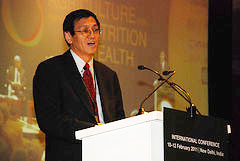In his closing remarks, Dr. Shenggen Fan, Director General at the International Food Policy Institute (IFPRI), referenced "The Way Forward" statement, a synthesis of the conference organizers' conclusions intended to stimulate international debate on the way forward and action.
Said Fan, "(A)fter three days of deliberations, what do we have to offer? Over the course of this conference, we have seen a great deal of enthusiasm, a lot of good ideas, and a new openness to dialogue across sectors. How do we channel that energy into new ways of thinking and acting? To help launch a conversation about the next steps, we at IFPRI have prepared a “Way Forward” Statement with input from the Conference Advisory Committee. This statement proposes some initial ideas about how we can get started and is based on four building blocks.
First, fill the knowledge gaps.
We need to invest much more in learning about the links and the best ways to exploit them.
Second, do no harm.
The links between agriculture and health and nutrition can be both beneficial and detrimental, so, let’s minimize the cases in which the three sectors work at cross-purposes.
Third, seek out and scale up innovative solutions.
So far, examples of interventions that combine two or three of these sectors are rare, but they do exist, and we should build on them.
Finally, create an environment in which cooperation can thrive.
Partnerships, communication, and mutual accountability can create incentives for working together.
This Way Forward statement is a living document subject to further debate and change. We invite you to go to the IFPRI website to contribute your own comments."



What I conclude from the conference is that the world suffers from two paradoxical problems- problem of under nutrition and over nutrition! At this junction, what we need is, collective efforts and linkages to be able to address these, by tailor making strategies and approaches to address both contradictions.
capacity development efforts at all levels, spanning policy makers, extension networks and grassroots level can play a key role in establishing the linkages between the sectors and to bring the needed 'paradighm shift'..
congratulations and gratitudes to IFPRI for intiating the dialogue.....
As nowadays more than half of the world population is living in cities, we have to pay a specific attention to urban dwellers, who rely mainly on food purchases for their food. The double burden of malnutrition is particularly important for urban households with obesity and deficit in micro-nutrient in the same family, with increased impacts during crisis or food price rises. The marketing and advertisement, often aggressive, shape the taste and consumption patterns, but as consumers, the urban dwellers are actors and drivers of the agri-food business. Food and nutrition security policies must take into account the specificities of urban dwellers. Especially, local authorities have a specific and key role to play in order to promote a food system that provides good and nutritious food for all the population, particularly the poorest people.
It is a good beginning of realisation of traditional wisdom that food has profound effect on health being source of nutrition. In contest of India where large number of children suffer from Vitamin A deficiency, my understanding is that so for we have not been able to utilise the available natural resourced by educating people to provide vitamin A from home preserved products such as dehydrated mango, papaya, carrot. India being the largest producer of mango, will be richest source of natural carotene commodity but have failed to convert it in more concentrated form and utilise on regular basis basically for consumption of target group. By Setting up small scale units for dehydration of nutritional fruits using improved technique can be of great help. Further, systemetic studies are required to see the bio-availability of such products including their function or diseases preventing ability for better health and well being.